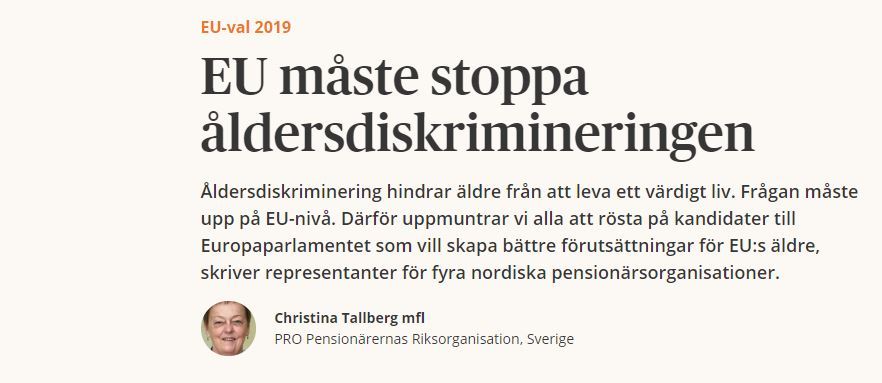Age discrimination hinders older people to live a dignified life and this issue must be addressed on EU level. Four representatives from different Nordic Pensioners’ Organisations encourage everyone to vote for candidates to the European Parliament elections who advocates for better conditions for older people in the EU.
It is time that the rights of older people and the fight against age discrimination remain on the EU agenda.
The need to improve the living conditions for older people need to be emphasized ahead of the EU elections on May 26. Much responsibility lies with the political parties from the Nordic countries within the EU (Denmark, Finland and Sweden) and the main issue to ensure that age discrimination against older people is a priority within the European Parliament.
Our respective organisation, together with the network of organisations forming AGE Platform Europe calls on the European Parliament to act on the seven points that are expressed in the AGE Platform Manifesto for the European Elections 2019.
The decisions taken by the European Parliament plays an important role for all the laws and policy decisions that are taken in national parliaments. We therefore need an EU that actively works for social policies and provides opportunities for more equal societies. We encourage everyone to vote for the European Elections on May 26 that are willing to take a stand and contribute to such developments.
Authors:
Christina Tallberg (PRO Pensionärernas Riksorganisation, Sweden)
Berit Bölander (SKPF Pensionärerna, Sweden)
Timo Kokko (Pensionstagarnas Centralförbund, Finland)
Palle Smed (Faglige Seniorer, Denmark)
Jan Koskimies (Eläkeläiset ry, Finland)
Read the article in Swedish on dagenssamhalle.se



